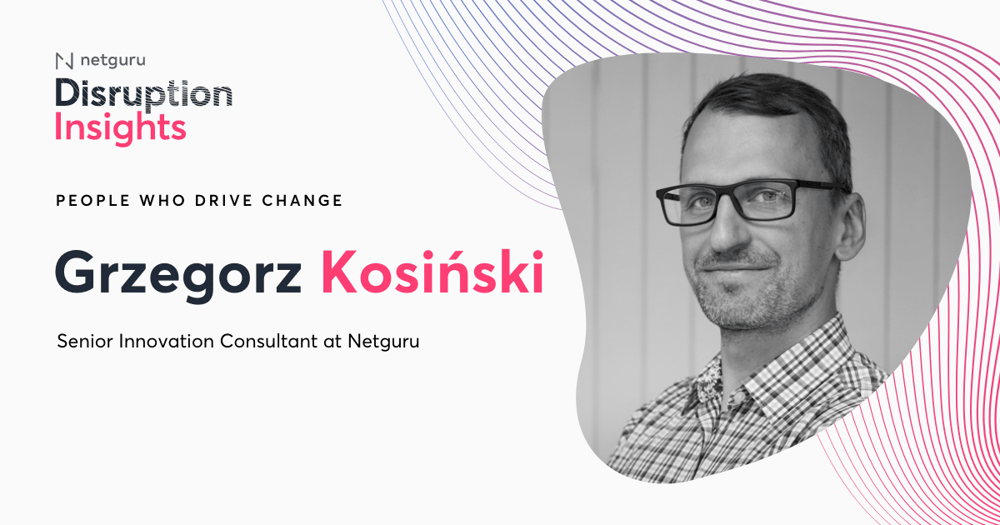Disruption Insights: Wealthtech Solutions Will Take the Leading Role in 2023

And looking at his experience, any fintech professional can’t afford to miss his insights. Grzegorz spent more than 10 years at Citi, where he held the role of Head of Innovation, among others. His broad expertise also includes process enhancement, portfolio management strategies, marketing research, as well as gathering customer insights to enhance digital customer journeys and experiences.
What technologies or solutions are really trending in fintech? Can we expect exponential growth in any fintech areas (like regtech or insurtech)? What role will regulators play in the expansion of financial startups? In the Disruption Insights series, we gather insights and opinions from industry experts to answer the most pressing questions and foresee the future fintech landscape.
💡 Trends in fintech
Solutions disrupting the industry right now
I expect wealthtech solutions to take the leading role in 2023. Market instability: global crisis, war in Ukraine, and rising inflation have a severe impact on the people’s wealth. All these risks may force them to look for investment opportunities to secure their level of assets.
The industry should follow that need and accelerate providing wealthtech solutions to address it.
Another area I would bet on is embedded finance, for the same reasons. Companies operating in various industries will look for additional business opportunities and the finance sector seems to be the right direction.
Entering the finance area is not that difficult anymore with an option to leverage partnerships and digital channels. It is already in line with forecasts. In the United States, the revenue generated by embedded finance in 2020 was estimated at $22.5 billion, and it was forecasted to reach over $230 billion by 2025.
Most impactful technologies in fintech
I would point to platform-based solutions that provide infrastructure for investment services, and I expect them to grow on a big scale. It ties directly to the increasing popularity of wealthtech solutions, many of which will operate using platform software. Moonfare, an alternative investment platform, is a great example of a business that already capitalizes on this growing niche.
Additionally, I would pick AI-based solutions. According to MIT Technology Review Insights's survey of 600 individuals holding senior technology positions, almost half of them select AI as a critical technology by 2025 (currently it is only 8%). The exponential growth of the Robinhood app is an example backing my bet on AI.
🌍 Current state of affairs
Impact of the market downturn
The level of investment in fintechs will decline. We may see some of them being merged or bought out by bigger tech players.
I don’t expect this situation to change anytime soon. For a long time, when the market situation was stable, fintechs were allowed to grow and develop product portfolios without proving their profitability. Many of them didn’t focus on the profitability in the short term purposefully, and they are now too deep into these projects to pivot and minimize inevitable losses brought about by market downturn.
As Andreas Wixler, CTO & Co-Founder at FINN put it during last year’s Disruption Forum Berlin, "Profitable growth is the name of the startup game now". Focus on hypergrowth at all costs is not an option anymore.
Let’s just look at three examples: Klarna, Revolut and N26. Last October N26 reported 14.4% higher net loss for FY 2021 compared to the previous year. A similar story involved Klarna that reported almost 4x bigger loss for 1H 2022 compared to the same period last year (data based on financial reports). Another well-known fintech, Monzo, also reported a loss in 2021, but in that case, it did not grow significantly.
VC investment in fintech
This relates to my previous answer – VCs will be more into verifying current investments than looking for the new ones, so I would definitely predict fewer VC investments in fintech in 2023. The first reports analyzing the total number and value of deals in 2022 indicate that global investments in the industry are lower by 46% compared to 2021.
What’s even more symptomatic is that the second half of 2022 noted a considerable slowdown, with Q4 2022 funding being at the lowest quarterly level since 2018 – only $10.7B. Most probably this trend won’t change throughout the whole of 2023.
As we still lack a significant number of proven cases that fintechs can be profitable in the long term, the time of investments based solely on a belief in business ideas’ potential is over.
Now, profitability is the main indicator of the startups’ future…
which doesn’t look bright for many organizations perceived as fintech’s miracles not that long ago.
🌱 Sustainable fintech
Sustainability should be present in every aspect of the company operations: from front and back-office, through customer service, policies, and decision-making processes to solutions offered to clients. I don’t think there is any other approach that can enable companies to be truly sustainable.
At the same time, many financial institutions don’t have long-term sustainability plans and their actions are limited to fleet or resource reduction. I’d like to see the so-called “sustainability efforts” translated into more tangible outcomes like adjusting credit policies based on the customer business model or main revenue sources.
Want to be a part of the Disruption Insights series? Shoot me an email at: paulina.burzawa@netguru.com
Learn from other fintech experts:
- "Care About the End-To-End Customer Journey" with Jesse Owens II from Wells Fargo
- "Organizations Need to Be More Conscious of the World They Operate In" with John Avery from FIS
- "Foster Innovation by Creating a Safe Space and Removing Typical Barriers" with Alvin Cho from Fiserv
.jpeg?width=50&height=50&name=PG%20foto%20(1).jpeg)
.jpeg?width=240&height=240&name=PG%20foto%20(1).jpeg)





%20(1).jpg?width=362&height=241&name=tablet%20and%20flowers%20(1)%20(1).jpg)
